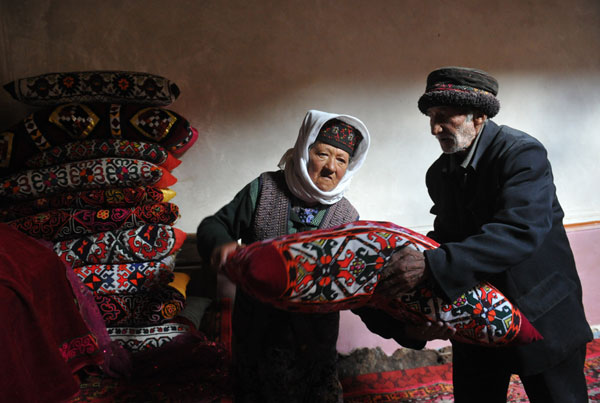Ancient land sees future in tradition
Updated: 2012-10-09 07:48
By Cui Jia (China Daily)
|
||||||||
No drop outs
Li Hangming, deputy secretary of Dabuldar village, said it will take time for the villagers to truly understand the importance of education. With the aid of finance from the regional government, Tashi Kuergan is the only county in Xinjiang that offers children 12 years of free education from the age of 7, he added.
|
 |
Even though he's in his 40s, Li couldn't resist the urge to join the two boys - whose idol is the Brazilian soccer star, Kaka - in their game. Meanwhile, the mountain goat, the star referee, continued his wandering.
Azzhan Roztam invited the visitor to drink milk tea and even asked his brother to slaughter a sheep for dinner. "The Tajiks are extremely hospitable. They might not be willing to sell one of their precious sheep, but won't hesitate for a minute to slaughter one for visitors," said Li, after politely declining the offer. Tajiks even use rope to secure their doors, instead of locking them when grazing their sheep, so passersby can enter the houses and rest whenever they want, he added.
After a few minutes, Li's cell phone rang and he had to rush to a nearby village to supervise relief efforts after heavy rainfall caused minor floods and landslides.
For Tajik children, the harsh conditions in this mountainous region - average altitude, 4,000 meters - make the journey to school a challenge, so most of the county's primary schools are boarding schools. It can take as long as five days to travel from the remotest village to the county capital, and so the local government purchased 14 school buses in March to make sure students can get to school safely.
 |
|
Nazarmemet Mirken, 79, and his wife organize ornately embroidered cushions and rugs at their home in the Tashi Kuergan Tajik autonomous county in Xinjiang. Yao Tong / for China Daily |
"Education could change the next generation of Tajiks and the effects are showing since it became a top priority for the county government in 2009," said Yu Hongsheng, deputy secretary of Tashi Kuergan village, adding that the school attendance rate is 99 percent.
The schools inform village officials if students play truant, but sometimes the parents don't care about their children's education. Many believe education to be pointless if the kids are simply going to follow in the family tradition and become herdsmen, said Yu.
"I often tell the parents that education can provide a whole range of options for the children, so I won't let any of the kids in my village become drop outs," he said. "They may live in one of the remotest parts of China, but their education must be right up to date."
In 2010, Yu rented a vehicle to transport a girl from her village in the summer pasturelands to senior high school in time for enrollment. The girl's family had no transport apart from horses and yaks. "The round trip cost me 1,000 yuan ($159) and took five days, but every student is worth the trouble," said Yu.
Burgeoning businesses
The rain hit the brothers' soccer field at the time Mahzarhan had predicted. "It might be snowing in Khunjerab now," he said, while looking at State Road 314 that runs past the front door of his home and ends up at Khunjerab, the border crossing with Pakistan. At an altitude of 5,000 meters, it's the highest border post in the world.
Heading west on State Road 314, two large white tents stood out against the seemingly endless green of the grassland. The clothes, in bold reds, yellows and blues, had been laid out on the grass around the tents. "Why hang them up when we have the space to dry them flat?" laughed Atokeli Gulinurto, dressed in Tajik costume and wearing a traditional flat-topped hat.
Atokeli doesn't live in the tents. Her house is in Mazar village, about 15 minutes' drive away. At an altitude of 4,300 meters, it is the highest village in Tashi Kuergan county. During the tourist season, which runs from July to September, the 55-year-old used the tents to run a restaurant with one of her sons. Visitors were provided with traditional Tajik foods while they drank in the views of the snowcapped mountains.
"At first, no one from the village was confident enough to take up the opportunity, so this year I decided to give it a try. Now, after seeing the number of guests coming to our tents, many other villagers have decided to try it next year," Atokeli said.
"I've heard people say that Tajiks are no good at running businesses and that all we know is herding. But, that's not true," she said passionately. "In the past, when all we had was the grasslands and our yaks, we had no other option, but now tourists are coming here. When business opportunities come, the Tajiks will take them, but we are still learning."
Atokeli has been catching up on accounting techniques, having lost count of the amount of money she made during the tourist season. "All I can remember is that I have sold 300 highland-barley naan breads since July," she said. In addition to the homemade naans, each of which can easily feed at least four people, the local thick, rich yak milk yogurt is a great favorite with visitors. Atokeli said she has sent her son to learn how to operate a barbeque, a style of cooking she intends to add to next year's menu.

 Relief reaches isolated village
Relief reaches isolated village
 Rainfall poses new threats to quake-hit region
Rainfall poses new threats to quake-hit region
 Funerals begin for Boston bombing victims
Funerals begin for Boston bombing victims
 Quake takeaway from China's Air Force
Quake takeaway from China's Air Force
 Obama celebrates young inventors at science fair
Obama celebrates young inventors at science fair
 Earth Day marked around the world
Earth Day marked around the world
 Volunteer team helping students find sense of normalcy
Volunteer team helping students find sense of normalcy
 Ethnic groups quick to join rescue efforts
Ethnic groups quick to join rescue efforts
Most Viewed
Editor's Picks

|

|

|

|

|

|
Today's Top News
Health new priority for quake zone
Xi meets US top military officer
Japan's boats driven out of Diaoyu
China mulls online shopping legislation
Bird flu death toll rises to 22
Putin appoints new ambassador to China
Japanese ships blocked from Diaoyu Islands
Inspired by Guan, more Chinese pick up golf
US Weekly

|

|







